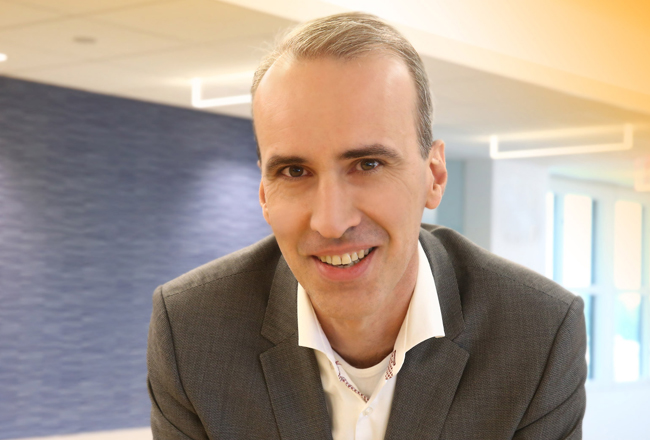Jean-Michel Boers doesn”™t often speak to the media, but in an exclusive interview with the Business Journal, he spoke of Boehringer Ingelheim”™s future as it marks 50 years in the U.S.
While understandably proud of Boehringer Ingelheim USA”™s reaching its golden anniversary this year, the president and CEO notes that parent company Boehringer Ingelheim was actually founded by Albert Boehringer in Ingelheim am Rhein, Germany ”” in 1885.
“So obviously we were doing business with the U.S. for years,” Boers said. “But when we set up operations here, Ridgefield was chosen, and that”™s where we”™ve been since.”

The 294-acre campus is the pharma giant”™s North American headquarters, but Boers noted that it has a number of other sites across the U.S., including in Fremont, California, and its animal health operation in Duluth, Georgia.
The latter was acquired in 2017, in an unusual arrangement where Boehringer Ingelheim paid €4.7 billion in cash to Sanofi to acquire its animal health division, Merial, which was valued at €11.4 billion. As part of the transaction, Sanofi acquired Boehringer”™s consumer health care business Thomae, which was valued at €6.7 billion.
The world”™s largest private pharma company, Boehringer worldwide reported a 3% rise in net sales in 2020 to about $23.2 billion, and a 22% increase in operating income to $5.6 billion.
The North American division posted a 1% increase in net sales last year, to about $10.8 billion.
Although there have doubtless been attempts at wooing the company away from Ridgefield, Boers insisted the company is there to stay.
“We”™ve become very attached to this site,” he said. “The fact that we”™re in the Northeast between Boston and New York makes Connecticut a good place to be when it comes to attracting talent.”
Ridgefield has about 1,900 employees, including R&D and back-office operations in addition to its executives. All together there are close to 9,000 employees throughout the country and over 50,000 worldwide.
The company”™s products include the type 2 diabetes medication Jardiance, co-developed with Eli Lilly, whose worldwide revenue was up 22% last year to nearly $1.15 billion; and Ofev, a treatment for idiopathic pulmonary fibrosis, whose sales increased last year by 38% to $2.34 billion. Global sales of other familiar names like asthma and COPD treatment Spiriva fell by 13% to $2.17 billion, while Trajenta/Jentadueto declined by 3% to $1.83 billion.
As with most companies, Covid-19 came as a bolt from the blue for Boehringer; unlike most, it had to keep most of its R&D team in its on-site laboratories. Boers said the firm implemented full safety precautions, including social distancing. After all, he said, R&D isn”™t just a major part of the company”™s business ”” BI spent nearly $4.5 billion on R&D in 2020, 7% more than in the previous year ”” but due to the long development and FDA review processes, any disruption could further negatively impact the delivery of medicine.
And it is studying treatments for conditions affected by Covid. Although it announced in March that it was discontinuing the Phase 2 trial of a compound for reducing the risk or severity of acute respiratory distress syndrome (ARDS) in patients hospitalized for the virus and requiring non-invasive oxygen support, Boers said another antibody treatment via inhalant is continuing to be tested.
Ultimately the company expects to have most everyone back on the Ridgefield campus over the next several weeks, Boers said. While the work-from-home procedures went smoothly, “We benefit from face-to-face discussions, although we will see what the future looks like. Offering flexibility for our employees and future employees will play a part, and as a result we will probably be a more agile organization.”
Boers also expressed admiration for the pharmaceutical sector at large. “The speed at which the industry was able to offer highly efficacious vaccinations is quite extraordinary,” he said. “It shows how important it is to invest in health care in the U.S.”
Challenges ahead
Nevertheless, he said, “We still need to look at the long-term effects of Covid.”
Another challenge for BI and the rest of the industry is ”” well, money. Keeping medicines affordable is an ongoing issue, Boers said, while spending millions on rebates and offering discounts to promote prescription drugs. Sanofi, Merck and Bristol-Myers Squibb have all recently reported downturns in average net prices, with Merck saying that 45.5% of its gross U.S. sales last year went to rebates, discounts and returns.
One part of BI”™s business unlikely to be affected is its philanthropy. In addition to his other titles, Boers chairs the Boehringer Ingelheim Cares Foundation board of directors. The independent nonprofit BI Cares, which is dedicated to improving the health and lives of people and animals, recently committed up to $450,000 in employee-directed funds to strengthen communities and address unmet needs.
Boers explained that the company”™s active U.S. employees are being encouraged to direct a one-time $50 donation (for the 50th anniversary) from BI Cares to one of the more than 40 eligible nonprofit causes in its matching gifts program. Five U.S. employees will each have an opportunity to direct an additional $5,000 BI Cares donation.
“There is a lot of volunteering in our company,” he noted, “which is probably because of our mission to providing first-in-class products and services to the health care industry and to our patients.”
Last year, BI Cares invested over $1 million in nonprofit programs in the communities where its employees live and work. The company also donated about $71 million in medicines to its various nonprofit partners, Boers said, including Americares in Stamford, along with a number of food banks and animal shelters.
Mention “animals” in the same breath with “pharmaceuticals” and many people envision grisly images of testing on dogs, monkeys and the like. While Boers acknowledged that BI does engage in such testing, he said that it “unfortunately is necessary” since new medications cannot be tested on humans before they have been done on animals.
“It helps us understand the toxicity of products,” he said. “But of course we work under the most recent highest standards with the authorities. We recognize we have a responsibility and the highest respect for animals.”
In 2019, BI confirmed that it would no longer use or fund the so-called “despair test,” which involved placing mice, rats and other small animals into inescapable beakers filled with water, thus forcing them to keep swimming. The putative reason for such tests was to study depression in animals and how certain medications could treat that condition.
Looking ahead, Boers said he agreed with a recent statement by Hubertus von Baumbach, the corporation”™s chairman of the board of managing directors, who forecast continued momentum in 2021, predicting a slight year-over-year increase in net sales.
“We are pretty confident that we can make sure the U.S. has the access to quality medicines that our innovative approach makes possible,” he said.
It”™s no mistake, he added, that Boehringer Ingelheim”™s motto is “Value Through Innovation.”















